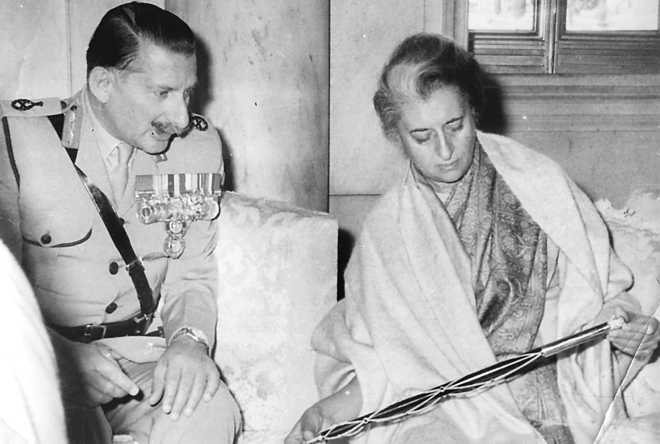Bharat Ratna should be bestowed upon him for exemplary achievements


Maj Gen Ashok K Mehta (retd)
former GOC, IPKF, Sri Lanka
HAD Field Marshal Sam Manekshaw been alive, he would have been 105 years young today. He is a conspicuously eminent case of denial of Bharat Ratna. ‘A nation that does not honour its brave is doomed to fail’ reads the epitaph on a plaque near the cricket pavilion at the Indian Military Academy, Dehradun.
It was the Indian soldier who stopped the Japanese onslaught in 1943 at the eastern gateway to India. It was near here that SHFJ Manekshaw took a hail of bullets across his gut to win an instant Military Cross (MC). He was so grievously wounded in the Battle of Sittang in 1942, and so spectacular was his bravery that Maj Gen Punch Cowan, thinking the wounds were fatal, pinned his own MC on Sam’s chest. This was only the beginning of a military career embellished with heroics, exceptional leadership and service before self. The Indian Army’s motto may have been reordered to ‘Nation First’, but the ethos, customs and traditions of sacrifice, putting one’s life on the line, a continuum with Manekshaw’s example, have endured. As he rose up the ladder of command, leadership and fame, his larger-than-life image and persona — popularised by his beloved Gorkha soldiers as Sam Bahadur — an unconventional style combined with a rare sense of humour and charisma, and with some histrionics slipped in, made him tower above other leaders.
Whether it was working in the sanctum sanctorum, Military Operations Directorate during the Kashmir war; stemming the tide of retreat in 1962 with his injunctions: ‘I have arrived. No more withdrawal’; holding the Eastern Front in 1965 War and defeating into abject surrender, the Pakistan army in 1971, were achievements of teamwork that only the ‘Manekshaw leadership’ style could produce. The idolised Manekshaw had become integral to the imagination of the military.
The 1971 victory was achieved against high diplomatic and military odds with at least three of the five permanent members of the UNSC championing Pakistan’s cause. After 2000 years of foreign rule, subjugation and the ignominy of the Panipat and Plassey syndromes, Manekshaw presented India with a clear and unambiguous battlefield triumph.
PM Indira Gandhi had a special fondness for Manekshaw as he could look her in the eye and call a spade a spade. She ensured he was awarded Padma Vibhushan and made a Field Marshal despite objections. She promised to make him CDS but the offer evaporated mysteriously. The popular thinking among the military and society at the time was that he richly deserved Bharat Ratna. If it was today’s surgical strikes era, it would have been a sure-shot.
Manekshaw was treated shabbily when he bade farewell to arms. Defence Minister Jagjivan Ram had ordered that no one would see him off at the New Delhi Railway Station when a special train would take him to Mettupalayam en route to Coonoor in the Nilgiris. When he died in a Military Hospital at Wellington, no politician or service Chief attended his cremation. Some amends were made later when Defence Minister AK Antony presented himself at the Parsi cemetery at Ootacamund when his gravestone was laid next to his wife, Siloo.
To remedy the honour delayed, the Modi government — if it returns to power piggybacking the armed forces — should confer Bharat Ratna posthumously on Manekshaw. The country’s highest civilian award, Bharat Ratna was instituted in 1954 for exceptional service of the highest order in any field of human endeavour and national public service. In the list of 48 awardees are economists, artists, industrialists, politicians, sportsmen and members of socio-cultural organisation, but no one from the military. In the US, the highest civilian awards are the Congressional Medal and President’s Freedom Medal that have been awarded to civilians for exceptional achievements and have included several decorated Generals like Colin Powell, Peter Pace and Douglas MacArthur, along with icons like Mother Teresa.
A public petition to PM Modi (acknowledged by the PMO on August 11, 2014) by Rohinton Ranja, supported by thousands of Manekshaw admirers to award him Bharat Ratna was apparently closed in April 2015 without any reason assigned. When national security is Modi’s election battle cry, it is only befitting to revive the movement urging the government to honour Manekshaw’s outstanding contribution to the country.
On November 4, 2017, the Army Chief, Gen Bipin Rawat, after unveiling the bust of the late Field Marshal KM Cariappa (and Gen KS Thimayya), had this to say in response to a question on Bharat Ratna for Cariappa: ‘If others can get, I see no reason why he should not be a deserving personality for the same.’ I am sure General Rawat would immediately recommend Manekshaw for Bharat Ratna.
The nation went berserk when the IAF carried out the solitary airstrikes after 1971 at Balakot inside Pakistan. This achievement is a drop in the ocean compared to Manekshaw’s monumental feat of defeating the Pakistan army comprehensively. He bequeathed on India not just military victory, but split Pakistan into two, mitigating threat from Pakistan and corrected a cartographical incongruity which the erudite Army officer-turned-politician Jaswant Singh has called ‘geography taking revenge over history’. It is time for correcting history by awarding Manekshaw the Ratna. In doing so, the country will also be honouring the Sam Bahadurs of the military.
